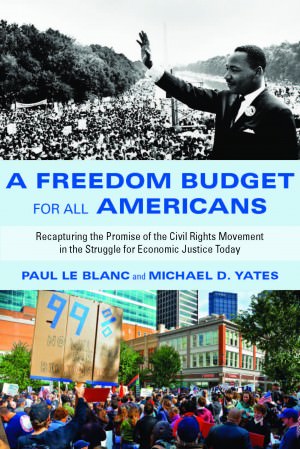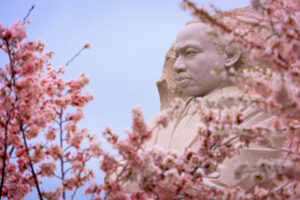A Freedom Budget for All Americans
Advanced in 1966 by central leaders of the activist wing of the civil rights movement, the "Freedom Budget for All Americans" promised the full and final triumph of the movement by going beyond civil rights and linking the goal of racial justice for African Americans with the goal of economic justice for all Americans.
Excerpted and adapted from Paul Le Blanc and Michael Yates,
“A Freedom Budget for All Americans: Recapturing the Promise of the Civil Rights Movement in the Struggle for Economic Justice Today” (New York: Monthly Review Press, 2013).
Inseparable from the goals projected by the historic 1963 March on Washington for Jobs and Freedom, the Freedom Budget for All Americans was advanced in 1966 by A. Philip Randolph, Bayard Rustin, and Martin Luther King, Jr., central leaders of the activist wing of the civil rights movement in the 1950s and ’60s. It promised the full and final triumph of the civil rights movement. This was to be achieved by going beyond civil rights, linking the goal of racial justice for African Americans with the goal of economic justice for all Americans. Randolph, Rustin, and King – as we document in our book – from their earliest years as activists for social change, believed in the need for a society in which our economy would be socially owned, democratically controlled, and utilized to meet the needs of all people. It can be shown that this socialist commitment was reflected in their strategic orientation to end racism.
The Freedom Budget proposal could be seen, and by some was seen, as being related to the twentieth-century liberalism that was ascendant in U.S. politics from Franklin D. Roosevelt’s New Deal to Lyndon B. Johnson’s Great Society. But its dimensions and implications were far more radical. It projected the elimination of poverty within a ten-year period, the creation of full employment, decent housing, health care and education for all people in our society as a matter of right. This was to be brought into being by rallying massive segments of the 99% of the American people in a powerfully democratic and moral crusade embracing the civil rights movement, the labor movement, progressive-minded religious communities, students and youth as well as their elders.
The defeat of this effort helped set the stage for an historic defeat for all of these constituencies. The crises of the twenty-first century’s first two decades cannot be separated from these defeats – just as keys to the positive resolution of those crises may be found in an exploration of what the Freedom Budget was, where it came from, what it might have done, and why it was defeated.
This defeat was related, in part, to a well-financed and steady, and soon accelerating, conservative onslaught that culminated in the right-wing triumph of the Reagan-Bush years. If the Freedom Budget had been successful, a majority of the voters would not have responded positively to candidate Ronald Reagan’s challenge to Democratic incumbent Jimmy Carter when the conservative hopeful asked the American people, at the conclusion of a televised 1980 debate: “Are you better off than you were four years ago? Is it easier for you to go buy things in the stores than it was four years ago?”
The 1980s victory for “free market capitalism” (embraced by most conservative Republicans and by many Democrats in succeeding years) has – sadly – made things worse for the great majority of the people over the four decades that followed, although certainly not for the wealthiest and most powerful 1%. Living standards, health, education, welfare, public transit, urban and natural environments, working conditions, job satisfaction, and more have dramatically declined.
For many U.S. residents back in the 1960s, this future was unimaginable. Since the 1930s, capitalism had yet to face another global downturn, and the common wisdom was that there would not be another. U.S. politics had been more or less dominated by a relatively generous social-liberalism since the coming of President Franklin D. Roosevelt’s New Deal during the Great Depression, maintained to a significant degree by Republicans as well as Democrats.
In 2008, many hoped the Presidency of Barack Obama would bring us back to that better, more hopeful, more generous world (personified in the minds of many by John F. Kennedy), and in a way that would be even more inclusive and more just than what had been possible in the 1930s and 1940s of FDR’s America. Obama’s enemies cursed this darkly as “socialism” – and for some of his supporters, that “S” word seemed not so horrible after all. But the realities of the Obama administration never matched his rhetoric, and even his rhetoric fell far short of what Roosevelt eloquently expressed during the Second World War as his vision of the post-war future of the United States, in the call for an Economic Bill of Rights.
The Radicalism of the Civil Rights Movement
In fact, the civil rights movement would not have been successful, to the extent that it was, without the active involvement of conscious and organized socialists.
Jacquelyn Dowd Hall, in a survey of the scholarship covering the complex and multifaceted story of what she calls the “long civil rights movement,” has noted that both conservative and liberal defenders of the social-economic-political status quo have done much to dilute and “sanitize” what really happened. Martin Luther King Jr. is presented as “this narrative’s defining figure – frozen in 1963, proclaiming ‘I have a dream’ during the march on the Mall.” Selective quotes, repeated over and over and over, result in his message losing its “political bite”:
We hear little of the King who believed that “the racial issue that we confront in America is not a sectional but a national problem” and who attacked segregation in the urban North. Erased altogether is the King who opposed the Vietnam War and linked racism at home to militarism and imperialism abroad. Gone is King the democratic socialist who advocated unionization, planned the Poor People’s Campaign, and was assassinated in 1968 while supporting a sanitation workers’ strike.
Hall insists on truthful accounts of what was felt, thought, advocated, and struggled for by activists who won and lost the various battles that made up the movement’s history. “Both the victories and the reversals call us to action, as citizens and as historians with powerful stories to tell,” she concludes. “Both are part of a long and ongoing civil rights movement. Both can help us imagine – for our own times – a new way of life, a continuing revolution.”
This spirit informs our effort in the present book to utilize the “Freedom Budget” for All Americans as a prism through which to gain a useful perspective on the history of the civil rights movement, as well as the history of the United States – and maybe its future.
The Freedom Budget that was advocated from1966 to 1968 was explicitly not a program for socialism. It was developed and advanced most effectively by socialists, however. It was seen by them as not only promising a realization of civil rights goals, and of improvements in the quality of life for all Americans, but also as a pathway that could help lead to a democratic socialist transformation of U.S. society.
The Freedom Budget could be seen as an expansion of the social-liberal orientation of the New Deal, and some of its supporters (and its critics) certainly saw it in that way. Yet there are some on the Right as well as the Left who would argue that just as capitalism necessarily involves the exploitation of labor in order to generate wealth, so will society-wide efforts to overcome poverty and inequality necessarily damage that system. This is so because this system requires, quite naturally, a certain level of unemployment, or “reserve army of labor,” and it also cannot do without devastating economic downturns, on occasion, to ensure the health of the market economy. The Freedom Budget had the potential, however, to seem reasonable and desirable to masses of people living in capitalist America. A popularly-supported Freedom Budget could have revolutionary implications, if it turns out that capitalism cannot accommodate it, if it proved incapable of realizing such reasonable, desirable goals and projections.
One key to understanding what happened in the experience of the civil rights movement has to do with the questions of organization and leadership. Masses of oppressed people, given their humanity, do not spontaneously or telepathically come up with collective plans of action based on shared analytical perspectives. This comes about through complex social and political processes: individuals and small groups develop analyses and strategies and tactics, which are communicated from a few people to more and finally many more people; and then there are the steps necessarily proceeding from ideas to implemented realities – all of which involves leadership and organization, and all of which is part of how history is made and society is changed.
The victories of the Montgomery Bus Boycott of 1955-56, for example, and of the Memphis sanitation workers strike of 1968, marked the beginning and the end of Martin Luther King’s life as a civil rights leader. Such efforts gave a poignant activist meaning to the soaring rhetoric of his “I Have a Dream” speech that electrified the 250,000 participants in the 1963 March on Washington and inspired millions of others. The fact that he and others like him (for example, Bayard Rustin) happened to be in each of these places is directly related to the existence of these powerful protests. Organizers and cadres animated by radical perspectives for economic justice were a key element in all that happened, from beginning to end.
Reform and Revolution
If the Freedom Budget had become a reality, most obviously, poverty in the United States would have been abolished. Everyone who wanted a job would have a job. Instead of economic inequality dramatically increasing over the past several decades, all people would be better off as the wealth gap narrowed and human needs were not sacrificed to amass super-profits for the top 1%. The very young, the elderly, and everyone in-between would enjoy greater care, greater security, greater dignity.
There would be universal health care as a matter of right. Quality education and educational opportunities would have been available to all people as a matter of right, without students amassing exorbitant debt in the process. There would be decent housing for all, as a matter of right, and there would be no slums. Our social and economic infrastructure – roads, bridges, public transportation, parks, libraries, hospitals – would have been improved and expanded as never before. It is likely that growing environmental and ecological concerns and knowledge would have been incorporated into the rebuilding of our economy and society. Cultural opportunities, individual creativity, and personal development would be encouraged and greatly enhanced.
Crime would have very significantly diminished with the elimination of so many of the things that cause crime. More than that, the criminal profiteering that has guided so much of U.S. foreign policy – amounting all too often to policies involving deceit, theft, and killing – would have been powerfully challenged and dramatically diminished. Violence would have been pushed back in many areas of life.
The immense power of big business corporations over our economic, political, social, and cultural life would be diminished, while the power of the great majority of the people (the 99% ) over these things would be greatly enhanced. There would be greater democracy, and the tremendous expansion of well-being and opportunities for all would mean a growth and deepening of personal freedom. Institutional racism would be gone, not just the Jim Crow system, but also de facto racism, including the racial differentials historically and currently existing among the different racial and ethnic groups in our society. Related to this, personal racism would be greatly diminished – the entire panoply of attitudes, prejudices, and practices caused by fear and want among ethnically and racially diverse peoples, and by different groups competing for scarce resources.
Despite differences, many of the more radical and the less radical partisans of the Freedom Budget were in agreement that its adoption and implementation would come about only through mass struggle, challenging and pushing back existing power structures and self-interested but influential defenders of an unjust and oppressive status quo. They agreed that such struggle could be won only through a movement reaching out to win the support of, and to effectively mobilize, the great majority of people – the working-class majority, trade unions, civil rights groups, those who oppose war and militarism, liberal-minded professionals, progressive religious constituencies, and the interracial poor – in a mighty coalition capable of bringing power to the people.
Martin Luther King, Jr. once explained that “power at its best is love implementing the demands of justice, and justice at its best is power correcting everything that stands against love.” He elaborated:
Power properly understood is nothing but the ability to achieve purpose. It is the strength required to bring about political and economic change. Walter Reuther defined power one day. He said, “Power is the ability of a labor union like the UAW to make the most powerful corporation in the world, General Motors, say ‘Yes’ when it wants to say ‘No.’ That’s power.”
Winning the Freedom Budget would have involved a dramatic power-shift whose implications and dynamics would have gone far beyond the specific confines of the Freedom Budget itself. It would have represented a dramatic expansion of freedom, equality, and democracy – moving powerfully in the direction of socialist transformation, which is nothing but the realization of all that has been said here.
This did not happen. The Freedom Budget was defeated, and the hopes it encompassed were destined to evaporate. History proceeded not as it might have, but as it actually did. In our book we seek to detail and document reasons for this defeat.
Toward a New Freedom Budget
Our society today needs a Freedom Budget, on the scale of what was proposed by A. Philip Randolph, Rev. Martin Luther King, Jr., and their co-thinkers almost half a century ago. However, a modern Freedom Budget will need to incorporate lessons learned from previous defeats, and at the same time adjust for new realities.
A broader consultation and consideration, reflecting the political and social forces that would be capable of making the New Freedom Budget a living reality, will need to take place. In the hope that such a process can be generated, we are offering here some thoughts on aspects of the principles, the objectives, the policies, and the strategic perspectives that might be embodied in such a New Freedom Budget. We are convinced that , at this point in history, only a more radical variant of what had been proposed can bring about the goals that Randolph and King were reaching for.
The hopeful days of the earlier Freedom Budget are gone. Barring radical changes, poor and working class men and women will be condemned to lives of disappearing hope. Austerity is everywhere the watchword of our economic and political rulers. For us, this means that it is long past time to put forward the kinds of demands that the mainstream political parties are unlikely to embrace, just as neither the Democratic nor the Republican party was inclined in years gone by to accept labor rights or racial justice before the labor movement and civil rights movement were able to mobilize massive and militant activity.
Our conception of the New Freedom Budget is grounded in five fundamental principles.
1. Liberty and justice for all: equal rights, equal opportunities – no exceptions. These are among the highest ideals that are articulated probably by the overwhelming majority of people in our society. The New Freedom Budget must allow for and help to nourish the free development of each and every individual – with no exceptions in relation to race, ethnicity, national origin, religion, gender, age, sexual preference, political orientation, physical characteristics, and the like.
2. Deepening democracy – politically, socially, economically. Democracy, rule by the people, must be the keystone of the New Freedom Budget. There is a growing conviction throughout the world that the political, social, and economic institutions of society must not be subordinated to tyrants or privileged minorities. The resources on which all of us are dependent, the resources that make our society possible, should be overseen democratically for the benefit of all. The notion that our country’s economy should develop as an integral part of a democratic commonwealth is sometimes labeled socialism – which is why the authors of this book consider themselves to be socialists. Regardless of such labels, we are convinced that a thoroughgoing democracy must be a defining principle of the New Freedom Budget. 3. Commitment to future generations. We do not conceive of the New Freedom Budget as some kind of a “quick fix” – its principles and objectives are meant to be durable, providing for the freedom and well-being of people in the here-and-now, but also their children and their children’s children, and beyond. This has obvious implications for the manner in which our resources must be utilized as we seek to provide for the needs of all.
4. Comprehensive solution—reject tokenism and fragmented “remedies.” We are persuaded by the insight of A. Philip Randolph, who commented on the fact that, in efforts for racial and economic justice, “we encounter the pessimists and the tokenists, those who counsel ‘gradualism’ and those who urge piecemeal and haphazard remedies for deep-rooted and persistence evils.” Randolph’s response to this holds true for the New Freedom Budget: such a limited approach “becomes an excuse for not beginning or for beginning on a base too small to support the task, and for not setting goals; and the scattered, fragmented remedies, lacking priorities and coordination, often work at cross purposes.”
5. Harmony with global neighbors. This principle addresses what we see as one of the most serious limitations of the earlier Freedom Budget, highlighted by its “neutrality” in regard to the U.S. war in Vietnam. The United States cannot resolve its own problems if it is guided by a foreign policy designed to establish or maintain something like “the American Century,” which meant domination of the global political economy by the United States. The well-being of the people of the United States cannot be secured at the expense of other peoples. There must be harmony between U.S. foreign policy and the domestic policies associated with the New Freedom Budget. As Martin Luther King insisted, policies of violence and exploitation must be replaced with those of mutual respect, cooperation, and economic justice.
We believe that to make freedom a reality, we must struggle to win:
1. Full employment
2. Adequate income for all who are employed
3. A guaranteed minimum adequacy level of income for those who cannot or should not work
4. Adequate and safe housing for all
5. Health care for all
6. Educational opportunity for all
7. Secure and expanded transportation infrastructure
8. Secure and expanded social security
9. Food security for all
10. A sustainable environment
11. Cultural freedom and enrichment for all (arts, parks, sports, recreation)
12. Reduction in the inequality of income and wealth, to ensure realization of objectives
We hope that readers will not only engage with the interesting and inspiring history of the original Freedom Budget but will be animated with the desire to put a New Freedom Budget into practice. The principles and objectives presented here can perhaps be seen as catalysts for further development by everyone who wants a different, more egalitarian and humane society than the one in which we now live.
We are certain of one thing. Unless radical change occurs, unless the power of the 1% is broken and the power of the 99% is asserted, the people of the United States, and nearly every other country in the world, are soon going to inhabit a world in which most of us will experience declining economic and political security, rising workplace exploitation, and a rapidly deteriorating environment. The time to think, to act, to make the world we want, is now.
Your support matters…Independent journalism is under threat and overshadowed by heavily funded mainstream media.
You can help level the playing field. Become a member.
Your tax-deductible contribution keeps us digging beneath the headlines to give you thought-provoking, investigative reporting and analysis that unearths what's really happening- without compromise.
Give today to support our courageous, independent journalists.




You need to be a supporter to comment.
There are currently no responses to this article.
Be the first to respond.